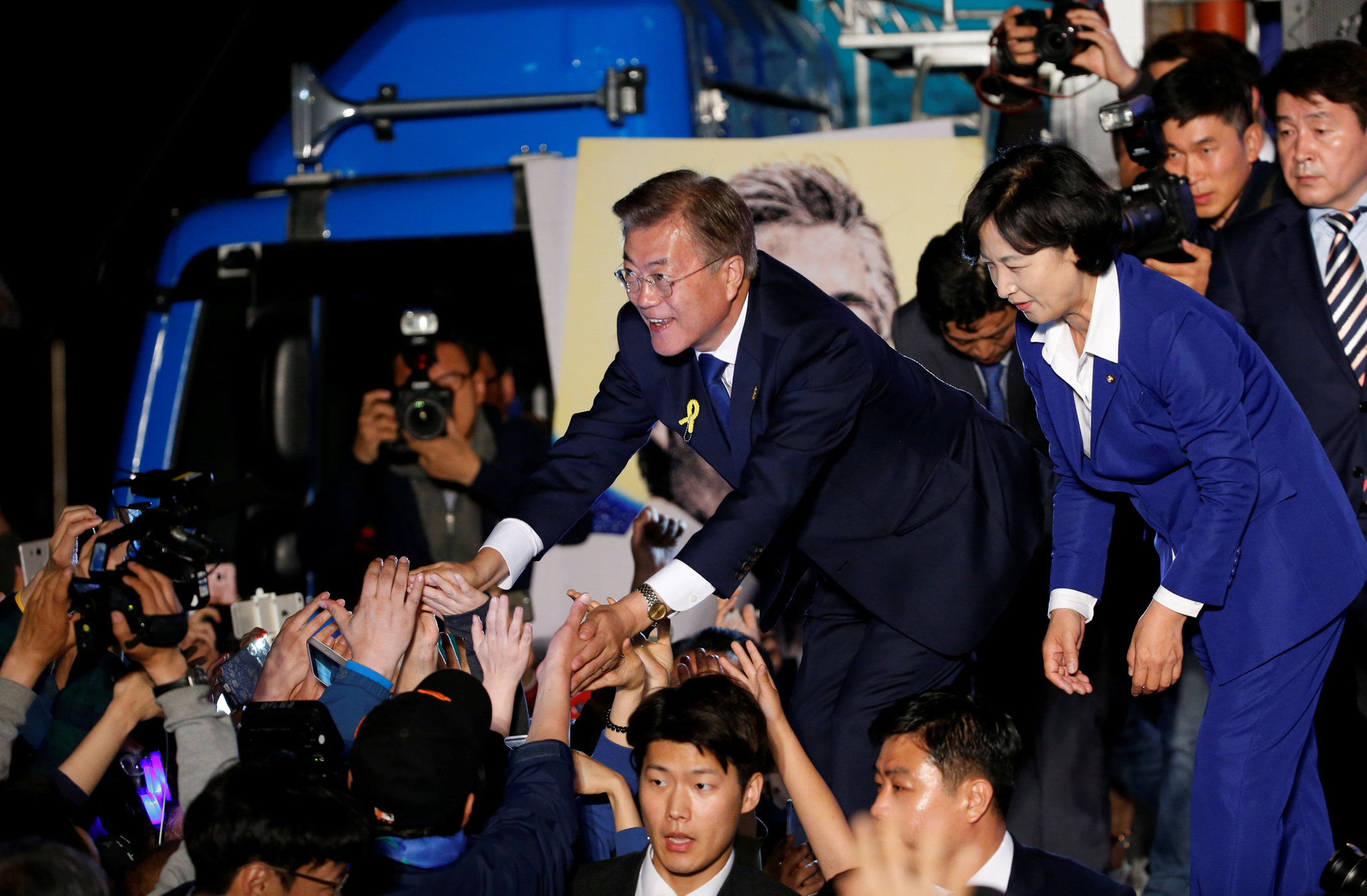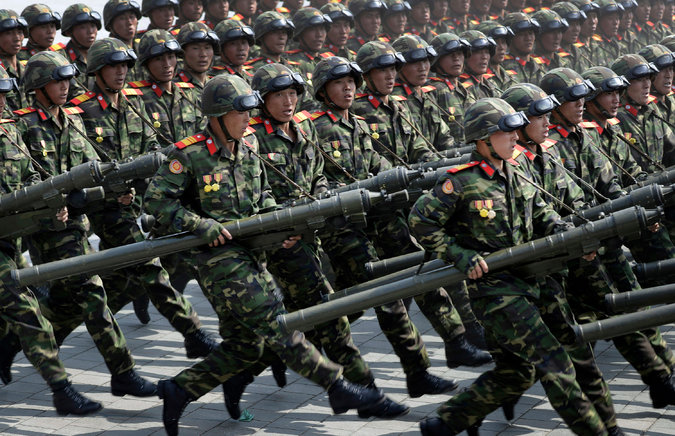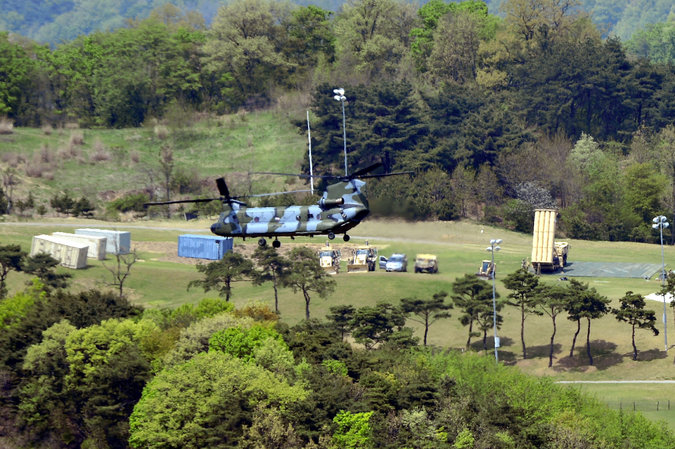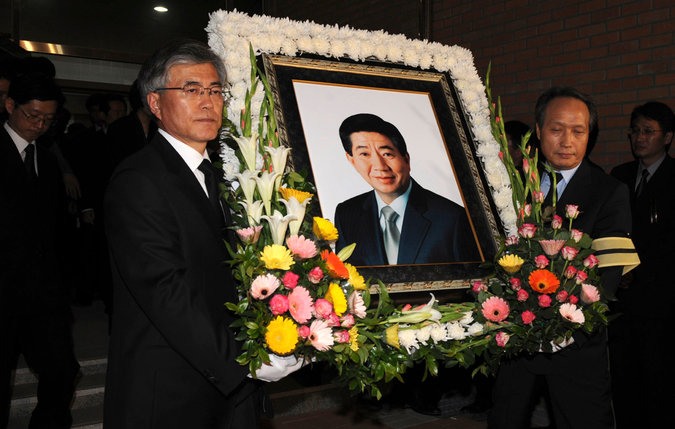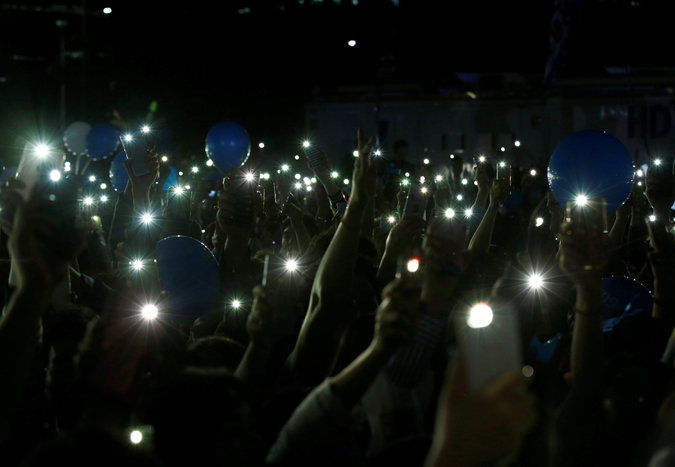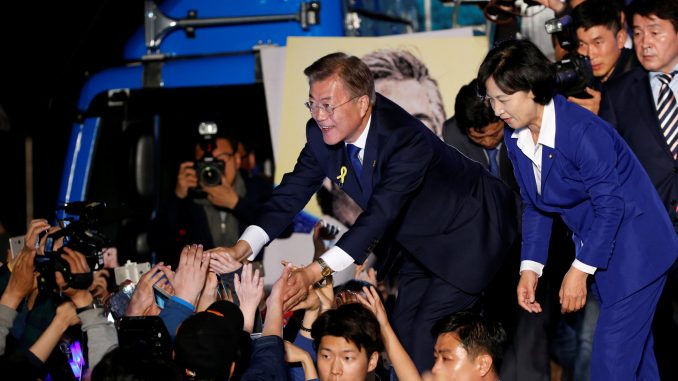
Victory caps national drama in which corruption scandals, mass protests & impeachment forced right-wing president from office, leaving conservative establishment in disarray and former leader in jail. Moon, 64, has pledged to enact changes to limit the power of big business and address the abuses uncovered in his predecessor’s downfall. He must also make good on his promise of a new approach to North Korea while balancing relations with US and China. His election immediately scrambles the geopolitics over North Korea’s nuclear arsenal. Even as Trump administration urges world to step up pressure on Pyongyang, it now faces prospect of a critical ally — one with the most at stake in any conflict with the North — breaking ranks and adopting a more conciliatory approach. Moon has argued US reliance on sanctions and pressure has been ineffective & it’s time to give engagement and dialogue w the North another chance, an approach favored by China. He also wants to review Pentagon’s deployment of THAAD antimissile defense system in South Korea that Chinese government has denounced. Here, Moon and the Democratic Party of Korea’s leader, Choo Mi-ae, greeting supporters at Gwanghwamun Square in Seoul after their election victory.
South Korea elected Moon Jae-in, a human rights lawyer who favors dialogue with North Korea, as president on Tuesday,
returning the nation’s liberals to power after nearly a decade in the political wilderness
and setting up a potential rift with the United States over the North’s nuclear weapons program.
His victory caps a remarkable national drama in which a corruption scandal, mass protests and impeachment forced a South Korean president from office for the first time in almost 60 years,
leaving the conservative establishment in disarray and its former leader in jail.
Moon, 64, a son of North Korean refugees, faces the challenge of enacting changes
to limit the power of big business and address the abuses uncovered in his predecessor’s downfall.
He must also make good on his promise of a new approach to North Korea while balancing relations with the United States and China.
His election immediately scrambles the geopolitics over North Korea’s nuclear arsenal.
Even as the Trump administration urges the world to step up pressure on Pyongyang,
it now faces the prospect of a critical ally — one with the most at stake in any conflict with the North —
breaking ranks and adopting a more conciliatory approach.
Moon has argued that Washington’s reliance on sanctions and pressure has been ineffective
and that it is time to give engagement and dialogue with the North another chance, an approach favored by China.
He has also called for a review of the Pentagon’s deployment of an antimissile defense system in South Korea that the Chinese government has denounced.
North Korean troops marching in a parade for the 105th anniversary of the birth of Kim Il-sung, the country’s founder, in Pyongyang last month.
In a nationally televised speech before cheering supporters, Moon declared that he would “be a president for all the people.”
He said he would work with political rivals to create a country where “justice rules and common sense prevails.”
With all ballots counted on Wednesday morning, Moon was in first place with 41% of the vote, according to the National Election Commission.
He was followed by Hong Joon-pyo, a conservative who had pledged a tough stance against North Korea, with 24%, and Ahn Cheol-soo, a centrist, with 21%.
Unlike his predecessors, Moon does not have a two-month transition period.
He will take office on Wednesday.
Seoul Now Returning To Previous North Korea Policy
Moon’s position on North Korea is a sharp departure from that of his two immediate predecessors,
conservatives who tended to view anything less than strict enforcement of sanctions against the North as ideologically suspect.
While he condemned “the ruthless dictatorial regime of North Korea” during his campaign,
Moon also argued South Korea must “embrace the North Korean people to achieve peaceful reunification one day.”
The Terminal High Altitude Area Defense, or THAAD, system was installed on a golf course in Seongju, South Korea, last month.
“To do that, we must recognize Kim Jong-un as their ruler and as our dialogue partner,” he said.
“The goal of sanctions must be to bring North Korea back to the negotiating table.”
David Straub, a former director of Korean affairs at the State Department and a senior fellow at the Sejong Institute, a think tank near Seoul,
warned of “serious policy differences between the U.S. and South Korean presidents” over North Korea and related issues.
He added that these differences could lead to “significantly increased popular dissatisfaction with the United States in South Korea.”
China, on the other hand, is likely to welcome Moon’s election,
which may make it easier for it to deflect pressure from the US to get tough on North Korea
and strengthen its argument that Washington must address the North’s concerns about security.
Some analysts say Moon’s victory could lower the temperature of the North Korean standoff,
prompting Washington and Pyongyang to pause and assess the effect of the new government in Seoul on their policies.
Satellite images indicate that the North has been preparing to conduct a sixth nuclear test,
and the Trump administration has engaged in a heated campaign of implied threats and military posturing to stop it.
Moon’s view of North Korea echoes the approach of the two liberal presidents who held power from 1998 to 2008
and pursued a so-called sunshine policy toward the North that included
- diplomatic talks,
- family reunions and
- joint economic projects, such as the Kaesong industrial park in North Korea, near the demilitarized zone.
Moon carrying a portrait of former President Roh Moo-hyun to a memorial altar at Roh’s hometown, Bonghwa, in 2009. Roh completed his five-year term in 2008 and committed suicide the next year.
North Korea’s Improved Power Position
But that era was punctuated by the North’s first nuclear test, conducted in 2006, and much has changed on the Korean Peninsula since.
With four more tests under its belt, each more powerful than the last, and a rapidly advancing ballistic missile program,
North Korea poses a greater threat to the South and appears to be closing in on nuclear arms capable of striking the US.
Moon also faces a mercurial adversary in Kim, 33, who took power in Pyongyang after the death of his father in late 2011.
Critics say any effort by Moon to revive the sunshine policy — perhaps by reopening Kaesong, which his disgraced predecessor, Park Geun-hye, shut last year —
would give North Korea a lifeline it could use to reduce its economic dependence on China,
weakening Beijing’s leverage over it and strengthening Kim’s hand.
THAAD A Problem for Moon In Two Different, Conflicting Ways
The American missile defense system, known as Terminal High Altitude Area Defense, or THAAD, presents another test for Moon.
It went into operation last week, and Moon has complained that its deployment was rushed to present him with a fait accompli.
But if he tries to undo it, he could strain the alliance with Washington — while leaving the impression of bowing to Chinese pressure.
That could be politically fatal in South Korea, where the public, across the political spectrum, is wary of the country appearing too deferential to big powers.
Many South Koreans complained that the US had foisted THAAD on their nation,
but they also fumed about retaliatory economic measures taken by China in response to its deployment.
Supporters of Moon during a campaign rally in Seoul on Monday.
Acknowledging the complexity of the challenges he faces,
Moon has been careful to say that when he promised to review the THAAD deployment,
he did not necessarily mean he would reverse it.
And while he has said South Korea must “learn to say no” to Washington,
he has emphasized that any diplomatic overture toward North Korea will be grounded in the South’s alliance with the United States.
Moon’s Family Refugees From North Korea
He has also often expressed gratitude to the US for protecting the South from Communism and supporting its transformation into a prosperous democracy.
Moon’s parents fled Communist rule during the Korean War
and were among tens of thousands evacuated from the North Korean port of Hungnam by retreating American Navy vessels in the winter of 1950.
They often told him about the Christmas sweets that US troops handed out to those packed into the ships during the journey.
Moon was born in January 1953, after his parents had resettled in a refugee camp on an island off the southern coast of South Korea.
His father was a handyman, and his mother peddled eggs, coal briquettes and black-market American relief goods.
Asked by the newspaper Dong-A Ilbo what he would do with a crystal ball,
Moon said last month that he would show his 90-year-old mother what her North Korean hometown looked like now and how her relatives there were faring.
“If Korea reunifies, the first thing I would do is to take my mother’s hand and visit her hometown,” he said.
“Perhaps I could retire there as a lawyer.”
Moon’s Mentor – Former President Roh Moo-hyun
In the 1980s, Moon defended student and labor activists persecuted under military rule
and forged a lifelong friendship with a fellow lawyer, Roh Moo-hyun.
When Roh was elected president in 2002, declaring that he would be the first South Korean president not to “kowtow to the Americans,” Moon served as his chief of staff.
Many of the misgivings that conservatives have about Moon stem from his association with Roh.
But some former American officials who dealt with the Roh government recall Moon as more practical and flexible than other officials.
In his memoir, Moon defended Roh’s decision to sign a trade agreement with the United States
and dispatch troops to Iraq over the protests of Roh’s liberal political base.
Roh completed his five-year term in 2008 and committed suicide the next year as prosecutors investigated corruption allegations against his family.
“It was the most painful day in my life,” Moon wrote in his memoir,
describing his friend’s death as “tantamount to a political murder”
and blaming a political vendetta by a new conservative government that wanted to discredit him.
Moon entered the 2012 presidential race vowing to finish Roh’s work by fighting
- corruption,
- the influence of the country’s family-owned conglomerates,
- what he called “politically motivated prosecutors” —
- and by seeking peace with North Korea.
But he narrowly lost to Ms. Park, the daughter of the South Korean military strongman Park Chung-hee,
and spent the next four years as a leader of the opposition.
In a recent interview, Moon recalled how he visited Roh’s predecessor, Kim Dae-jung, the Nobel Peace Prize laureate and architect of the sunshine policy, shortly before Kim died in 2009.
Kim was so feeble by then that he had to be fed by his wife, and he was heartbroken.
He had devoted much of his career to building trust with North Korea through humanitarian and economic aid,
and the conservatives in power were dismantling that legacy and embracing sanctions against the North.
“President Kim said he could not believe his eyes,” Moon recalled.
“In what I thought was his dying wish, he asked us to take the government back.”
Source: South Korea Elects Moon Jae-in, Who Backs Talks With North, as President – The New York Times
